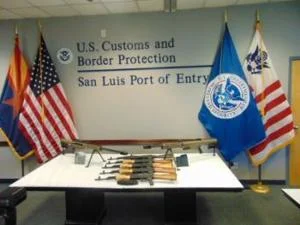U.S. Customs and Border Protection (CBP) officers working at the Area Port of Houston/Galveston are seizing large amounts of firearms, “many of which are smuggled southbound to dangerous nations such as Honduras,” CBP said Wednesday. “These weapons shipments could fuel chaos and contribute to escalating violence and instability in regions already grappling with security challenges.”
In the last two years through June 2025, CBP officers working under the Biden and Trump administrations seized more than 400 handguns and long arms, nearly 1,000 magazines and gun parts, and nearly 52,000 rounds of ammunition, according to the latest CBP data.
“The attempted smuggling of these guns and individual parts is often done by masking them within shipments of otherwise legitimate goods in shipping containers headed to sea,” CBP said.
CBP enforcement efforts at key Texas ports are part of border security efforts farther inland, recognizing that shipping containers, ports, ships, and illegal transport by sea present national security threats.
Ongoing efforts are focused on disrupting transnational criminal activity, while also “providing law enforcement counterparts with intelligence that can lead to identification, arrest, and prosecution of individuals working as part of these global criminal networks,” CBP says.
“CBP’s core function is to keep Americans safe by ensuring that weapons and terrorists do not enter the United States,” CBP Area Port Director Thomas Mahn of Port Houston/Galveston said. “We remain vigilant in our mission to prevent the illegal import or export of firearms and other contraband that can fuel violence and instability abroad and these seizures are a testament to the dedication and expertise of our officers who work tirelessly to protect our borders and communities.”
Recent firearms seized by CBP were all found concealed in shipments of household goods – all leaving Texas for Honduras. One seizure came after CBP officers found 20 rounds of 45 ACP ammunition hidden in one shipment of used household goods. In another, they found a shotgun and 25 12-gauge shotgun shells hidden in a shipment; in another, two pistols, two scopes, five magazines, one red dot sight, and 117 rounds of ammunition found concealed in a shipment of used household goods. In another instance, they found two rifles, two magazines, and 769 rounds of ammunition concealed in a shipment of used household goods destined for Honduras.
CBP officers at the port are also seizing counterfeit goods. The latest large seizure was of roughly $7 million in counterfeit USB iphone chargers in 7,460 cartons with an “Apple” trademark, confirmed to be counterfeit by Apple, CBP said.
“Criminal networks are using e-Commerce to ship their items to unsuspecting consumers and exploit the high volume of cargo processed by CBP,” CBP Acting Area Port Director John Landry said. “Counterfeit activities negatively impact American legitimate jobs and counterfeiters don’t pay taxes. They hurt innovation by stealing intellectual property from registered trademarks and the counterfeits are often produced under unsanitary labor exploitation conditions. Consumers deserve the real deal when spending their hard-earned money on these products.”
CBP enforces over 400 laws for 40 U.S. agencies, including consumer protection and trade laws. “Counterfeiting is stealing, period, and it is illegal to purchase counterfeit goods. Bringing them into the United States may result in civil or criminal penalties and purchasing counterfeit goods often supports criminal activities, such as forced labor or human trafficking,” CBP says.
Roughly 90% of counterfeit products seized by CBP are coming from China and Hong Kong, with the greatest MSRP value of fake products seized being jewelry, watches and handbags/wallets, it says.
“Trade in counterfeit and pirated goods threatens America’s innovation economy, the competitiveness of our businesses, the livelihoods of U.S. workers, and, in some cases, national security and the health and safety of consumers,” CBP says. CBP agents at ports are targeting and seizing imports of counterfeit and pirated goods as well as enforcing exclusion orders on patent-infringing and other IPR violative goods, it says.






